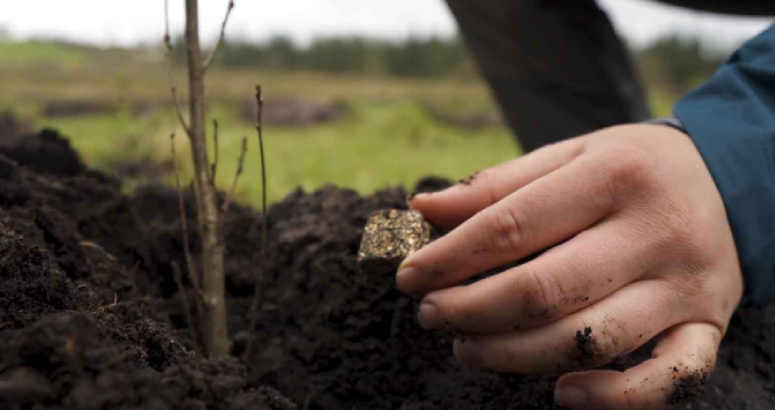Scottish Water Partners with Rhizocore Technologies to Pioneer Innovative Approach to Woodland Creation
26 November 2024
Scottish Water is piloting an innovative approach to woodland creation through the use of fungal pellets which aim to produce more resilient forests, increase carbon capture potential and reduce the need for fertiliser.“By reintroducing these vital complementary relationships to the soil when we plant the saplings, we are aiming to strengthen the success rate of these projects.”
Stephen Garbett
Project Manager, Scottish Water
The pellets, produced by Edinburgh-based start-up venture Rhizocore Technologies, utilise native fungi to create a symbiotic underground nutrient network that helps both trees and fungi to flourish.
They are planted alongside the saplings so that the fungi and tree roots can establish a connection, grow together, and the fungi can provide water and nutrients to the tree.
The use of these Rhizopellets has been shown to increase the survival rate of saplings by more than 20%, as well as maximising tree growth, eliminating the need for fertiliser to be used on planting sites and increasing the carbon sequestration rates of the woodland soil.
Scottish Water will trial the use of the pellets across 10 of its woodland creation sites. Monitoring will be carried out to establish the impact they have on the success of the projects.
Dr Mark Williams, Scottish Water’s Head of Sustainability and Climate Change, said: “We are always looking for innovative ways to help us reach our net zero targets and along with peatland restoration and sustainable land management, woodland creation in the right areas is a key part of efforts to balance emissions we cannot eliminate.
“We are excited to trial these Rhizopellets across a range of our sites, where we will hopefully see the benefits in terms of stronger trees that do not require fertiliser, as well as an increase in the amount of carbon captured by the woodlands.”
Scottish Water Project Manager Stephen Garbett added: “Often, the sites we have identified for woodland creation have not had trees planted on them for some time, which means the natural mycorrhiza fungi is no longer present at these locations.
“By reintroducing these vital complementary relationships to the soil when we plant the saplings, we are aiming to strengthen the success rate of these projects. The pellets also reduce the need for fertiliser at these sites, which are often located around drinking water sources, so there is the added benefit of helping to protect the water quality.”
Rhizocore Technologies CEO, Dr. Toby Parkes, said: “Mycorrhizal fungi play a key role in the healthy functioning of forest ecosystems. They provide nutrients, retain water, improve soils and protect the trees from disease.
“They are also completely reliant on trees for their survival, so on most tree-planting sites the symbiotic fungi that support trees are not present and we should be aiming to establish their mycorrhizal partners at the same time.
“For those reasons, we are incredibly excited about our partnership with Scottish Water and the impact we can have together on woodland creation, biodiversity improvement and carbon draw down both above and below ground.
“We have had fantastic results for customers who replace fertiliser with our Rhizopellets and we are looking forward to seeing similar growth on the Scottish Water sites as their trees, and our fungi, establish and thrive.”







